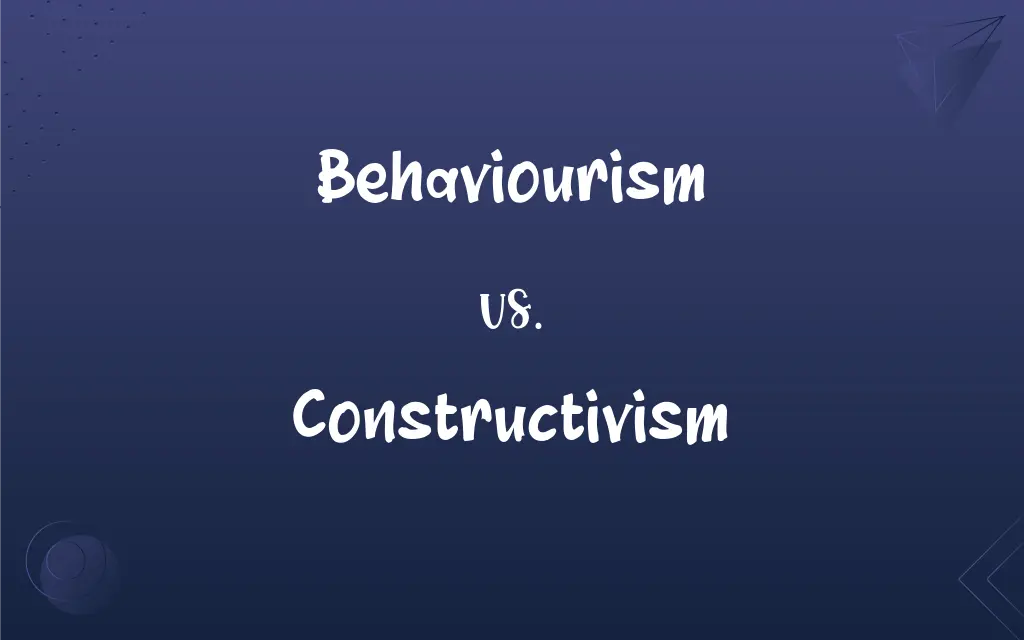Behaviourism vs. Constructivism: What's the Difference?
Edited by Aimie Carlson || By Janet White || Published on January 6, 2024
Behaviourism focuses on observable behaviors and external stimuli, while constructivism emphasizes individual learning through experience and constructing knowledge.

Key Differences
Behaviourism concentrates on observable behaviors and the influence of external stimuli. Constructivism, however, focuses on how individuals construct knowledge through their experiences and interactions.
In behaviourism, the environment is seen as the primary factor shaping behavior through conditioning. Constructivism views the environment as a context for learners to interact with and construct understanding.
Behaviourism advocates for learning as a change in behavior due to external stimuli, often through reinforcement. Constructivism sees learning as an internal process where learners actively build new ideas or concepts based on their experiences.
Behaviourism often portrays the learner as passive, responding to environmental stimuli. In constructivism, learners are active participants in their learning, using critical thinking to build personal understanding.
Behaviourist strategies focus on repetition, reinforcement, and conditioning. Constructivist strategies involve problem-solving, inquiry-based learning, and facilitating personal exploration.
ADVERTISEMENT
Comparison Chart
Learning Focus
Observable behaviors and external stimuli
Individual experiences and knowledge construction
Role of the Environment
Primary factor in shaping behavior
Context for interaction and understanding
Nature of Learning
Change in behavior through reinforcement
Active building of ideas and concepts
Role of the Learner
Passive, responding to stimuli
Active, engaging in critical thinking
Educational Strategies
Repetition, reinforcement, conditioning
Problem-solving, inquiry-based learning
ADVERTISEMENT
Behaviourism and Constructivism Definitions
Behaviourism
Learning theory based on stimulus-response relationships.
Behaviourism uses conditioning to modify behaviors in therapy.
Constructivism
Emphasis on learner's active role in constructing knowledge.
Constructivism involves students in active problem-solving.
Behaviourism
Study of observable behavior and external stimuli.
Behaviourism explores how rewards shape a student's behavior.
Constructivism
Application of inquiry-based and explorative learning methods.
Constructivism uses project-based learning to facilitate understanding.
Behaviourism
Application of reinforcement and punishment in learning.
Behaviourism applies positive reinforcement to increase desired behaviors.
Constructivism
Focus on internal cognitive processes rather than external behavior.
Constructivism explores how learners interpret and understand new information.
Behaviourism
Focus on external behavior changes rather than internal processes.
Behaviourism measures success through changes in observable actions.
Constructivism
Incorporation of learners' backgrounds and experiences in learning.
Constructivism tailors learning experiences to individual backgrounds.
Behaviourism
Emphasis on environmental factors in shaping behavior.
Behaviourism studies how environmental cues trigger specific behaviors.
Constructivism
Theory of learning based on experience and personal construction of knowledge.
Constructivism encourages students to build their understanding through exploration.
Behaviourism
(British spelling) behaviorism
Constructivism
A movement in modern art originating in Moscow in 1920 and characterized by the use of industrial materials such as glass, sheet metal, and plastic to create nonrepresentational, often geometric objects.
Behaviourism
Same as behaviorism.
Constructivism
(arts) A Russian movement in modern art characterized by the creation of nonrepresentational geometric objects using industrial materials.
Behaviourism
An approach to psychology that emphasizes observable measurable behavior
Constructivism
(mathematics) A philosophy that asserts the need to construct a mathematical object to prove it exists.
Constructivism
A psychological epistemology which argues that humans generate knowledge and meaning from their experiences.
Constructivism
An abstractionist artistic movement in Russia after World War I; industrial materials were used to construct nonrepresentational objects
FAQs
How do behaviourists view learning?
As a process of behavior change triggered by environmental stimuli.
What is the role of experience in constructivism?
Experience is crucial, as it forms the basis for personal knowledge construction.
What is behaviourism?
A learning theory focusing on observable behaviors influenced by external stimuli.
How does constructivism view the learner?
As an active participant in their learning process.
Is conditioning a part of behaviourism?
Yes, conditioning is a key concept in behaviourism for modifying behavior.
What defines constructivism?
A theory emphasizing learning as an active process of constructing knowledge from experiences.
How does constructivism approach problem-solving?
It encourages learners to engage in inquiry-based and explorative problem-solving.
What is reinforcement in behaviourism?
It's a technique to encourage or discourage behavior using rewards or punishments.
Can constructivism be used in group learning?
Yes, constructivism supports collaborative and group learning activities.
Do behaviourists consider internal thoughts?
Behaviourism primarily focuses on observable behavior, not internal thought processes.
How does constructivism influence classroom design?
It promotes a learner-centered environment encouraging exploration and interaction.
What are the criticisms of behaviourism?
It's criticized for ignoring mental processes and over-simplifying learning.
How does constructivism handle learner differences?
It tailors learning to individual experiences and backgrounds.
What types of strategies do behaviourists use?
Strategies like repetition, reinforcement, and conditioning.
Can behaviourism explain complex learning?
It has limitations in explaining complex cognitive processes.
Is behaviourism still relevant in modern education?
While debated, its principles are still applied in certain educational contexts.
Does constructivism support standardized testing?
Constructivism generally favors assessments that are more reflective of individual learning processes.
Does behaviourism apply to emotional learning?
Behaviourism mainly addresses observable behaviors, less so emotions.
How does constructivism handle mistakes in learning?
Constructivism views mistakes as opportunities for deeper understanding.
What role do teachers play in constructivism?
Teachers guide and facilitate, helping learners construct their understanding.
About Author
Written by
Janet WhiteJanet White has been an esteemed writer and blogger for Difference Wiki. Holding a Master's degree in Science and Medical Journalism from the prestigious Boston University, she has consistently demonstrated her expertise and passion for her field. When she's not immersed in her work, Janet relishes her time exercising, delving into a good book, and cherishing moments with friends and family.
Edited by
Aimie CarlsonAimie Carlson, holding a master's degree in English literature, is a fervent English language enthusiast. She lends her writing talents to Difference Wiki, a prominent website that specializes in comparisons, offering readers insightful analyses that both captivate and inform.






































































